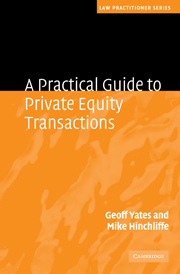Book contents
- Frontmatter
- Contents
- List of figures
- Foreword
- Preface and acknowledgments
- Table of cases
- 1 An introduction to private equity
- 2 The deal process and preliminary matters
- 3 Transaction structures and deal documents
- 4 Acquisition issues
- 5 Equity documentation
- 6 Debt funding
- 7 Employment-related issues
- 8 Pensions
- 9 Tax on private equity transactions
- 10 Public-to-private transactions
- 11 Living with the investment
- 12 Secondary buyouts
- 13 Exits
- Index
7 - Employment-related issues
Published online by Cambridge University Press: 04 May 2010
- Frontmatter
- Contents
- List of figures
- Foreword
- Preface and acknowledgments
- Table of cases
- 1 An introduction to private equity
- 2 The deal process and preliminary matters
- 3 Transaction structures and deal documents
- 4 Acquisition issues
- 5 Equity documentation
- 6 Debt funding
- 7 Employment-related issues
- 8 Pensions
- 9 Tax on private equity transactions
- 10 Public-to-private transactions
- 11 Living with the investment
- 12 Secondary buyouts
- 13 Exits
- Index
Summary
Introduction
In this chapter, we consider the key employment terms of the managers that will need to be negotiated alongside the other transaction documents. Issues concerning remuneration, notice periods, grounds for dismissal and the like will often be emotive, and the negotiation of the managers' service agreements in the (often adversarial) context of the wider deal can accentuate this further. Of course, it is important to the managers that their legal adviser fights their corner in negotiating a fair position. However, it is also true that a manager needs to be mindful of the fact that generous terms negotiated for the benefit of that manager and his or her colleagues may come back to bite, should one of those managers fail to deliver and need to be replaced. Like the negotiation of the other equity documents discussed in chapter 5, the key is to ensure that each manager balances his or her position as a director and shareholder of Newco with their requirements as an employee.
We will also consider the interaction of the termination of employment provisions in a service agreement with the equity position of the manager. There is usually significant overlap, such that an employment lawyer negotiating these terms needs to be familiar with the issues being discussed and negotiated in the investment agreement and articles of association, and vice versa. Common approaches to ‘Good Leaver’ and ‘Bad Leaver’ definitions, highlighted in chapter 5, will therefore be considered again in the context of the termination of a manager's employment.
- Type
- Chapter
- Information
- A Practical Guide to Private Equity Transactions , pp. 203 - 228Publisher: Cambridge University PressPrint publication year: 2010



